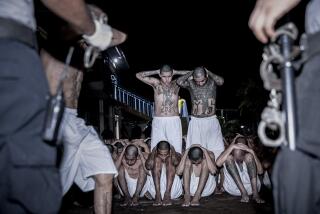Spain Could Do Better on Terror Suspects, Group Says
- Share via
ROME — Spain does a better job than the United States at respecting the rights of terrorism suspects but still needs to improve their access to attorneys, doctors and interpreters as the country wages its own war on terror, according to a new report released today.
Although Spain strives to set a global example in the way it handles suspects, it falls short in its obedience of international law by holding prisoners incommunicado and judging them in secret legal proceedings, the New York-based Human Rights Watch said in a 65-page study.
“For Spain to assume a leadership position in the fight against terrorism without undermining respect for human rights standards, critical changes must be made to both the law and practice of its counter-terrorism measures,” the human rights organization said.
Most of the laws that successive Spanish governments have been using to battle political violence were written as part of a guerrilla war with ETA separatists demanding independence for the Basque region.
But Spain witnessed and suffered a new level of bloodshed March 11, 2004, when Islamic militants killed nearly 200 people by bombing three commuter trains in Madrid. In addition, dozens of people suspected of having ties with Al Qaeda, and in some cases with the Sept. 11 attacks in the U.S., have been arrested in Spain.
All of this has put more pressure on Spanish authorities to crack down on Islamic militancy within their borders and toughen what critics have charged is an overly lenient tolerance of radicals.
Human Rights Watch said Spanish authorities are failing to guarantee detainees’ basic rights during incarceration, both before and after trial.
Under Spanish law, suspects can be held incommunicado, without access to a lawyer of their choice or to family members for 13 days; the limit by law was five days before November 2003. The U.S. is holding some foreign-born suspects indefinitely.
In addition, the human rights organization said, suspects in Spain are not allowed to confer in private with their court-appointed attorneys during this period of detention.
“This makes the lawyers little more than silent witnesses, and effective challenges to the grounds of detention extremely difficult,” Rachel Denber, acting executive director of the Europe and Central Asia division of Human Rights Watch, said in a statement.
Spain also came under criticism for plans to monitor or regulate hundreds of storefront mosques and the imams who preach at them; for the swift expulsion of foreign nationals with suspected ties to international terrorism back to home countries where they might be tortured or otherwise abused; and the dispersal of pretrial detainees to prisons all over the country, hundreds of miles from their families and lawyers.
In addition, Spain’s practice of keeping some cases secret to “preserve the integrity” of investigations, as judges described it, has a “devastating impact” on lawyers’ ability to defend their clients, the report said.
There was no immediate comment from the Spanish government. The report was not scheduled to be released in Spain until later today, and Prime Minister Jose Luis Rodriguez Zapatero has been traveling in Argentina.
“Spain is right to tackle terrorism through the criminal courts,” Denber said. “But the government needs to ensure that terrorism suspects have the due process rights necessary for an effective defense. Only then will Spain be a real leader.”
More to Read
Sign up for Essential California
The most important California stories and recommendations in your inbox every morning.
You may occasionally receive promotional content from the Los Angeles Times.














